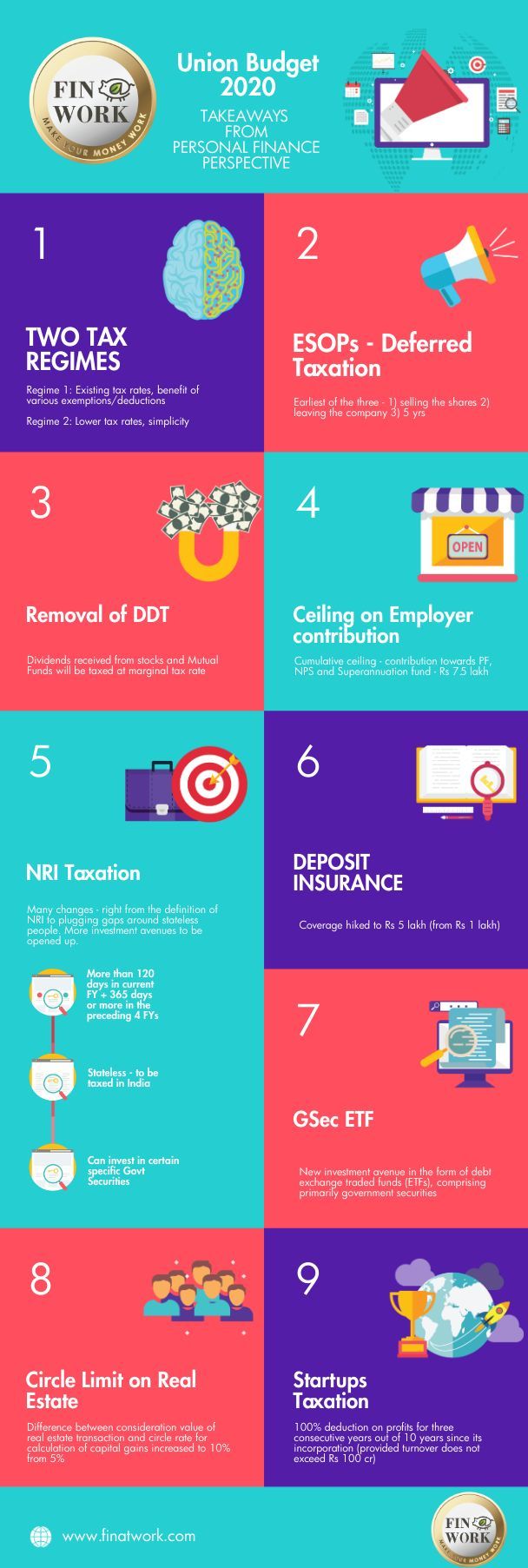The introduction of additional tax regime is one of the biggest takeaways from Budget 2020. In past, Govt had used taxation as a tool to nudge people towards good investment behaviour. However, creation of new tax regime is a clear indication that Govt wants to empower people and step back from guardian role. Now its up to the individual what s/he wants to do – spend that extra disposable income or invest it the way s/he wishes.
People in higher tax brackets (above INR 20 lacs), might find new one as “no nonsense” tax regime, however which regime will work better from net tax liability perspective will depend on case to case basis (based on deductions and exemptions one is planning to avail).
Those in lower tax brackets, will have to make choice if they wish to have more “disposable income in hand” or enjoy higher tax benefit while investing in specified areas (life, health, retirement, housing etc).
Note: IT Dept has put up a calculator which helps you compare which one will work out better for you, you can access it here (https://www.incometaxindiaefiling.gov.in/Tax_Calculator/index.html?lang=eng)
Removal of Dividend Distribution Tax (DDT) is another area where it will have uneven impact. Those in higher income tax brackets, would find it being taxed at higher tax rate. While not much can be done on dividend from stocks (will have to declare it while filing taxes), they would be better off switching from dividend option to growth option of Mutual Funds. People in lower income tax brackets, particularly those who are Retired and dependent upon dividend income, would welcome this change.
Now having these out of the way, let us look at the rest:
Negatives:
1) Cumulative ceiling by employer for provident fund, NPS and superannuation fund has been limited to Rs 7.5 lakh annually. Any contribution by employer above this to be considered as perquisite and will be taxed in the hands of the individual.
2) Definition of Non Resident Indian (NRI) from tax perspective has been changed. There is a tightening of residency criterion, people have to now spend more time abroad to qualify as NRI
Earlier: Considered resident if stayed in India for 182 days or more
Now: 2 scenarios either stay for 182 days or more OR stays more than 120 days in current financial Year + 365 days or more in the preceding 4 financial years.
Positives:
1) Reduction in burden of taxation on employees of startups by deferring tax payment by five years, or till they leave the company, or when they sell their shares, whichever is earliest
2) New investment avenue in the form of debt exchange traded funds (ETFs), comprising primarily government securities
3) Deposit insurance coverage hiked to Rs 5 lakh from Rs 1 lakh
4) Non-resident Indians can invest in certain specified categories of government securities
5) Difference between consideration value of real estate transaction and circle rate for calculation of capital gains increased to 10% from 5%
6) Deduction of 100% of profit allowed to startups with turnover of Rs 100 crore for three consecutive assessment years from Rs 25 crore. Also, the period of eligibility for claiming deduction extended to 10 years from seven years earlier
7) Tax dispute scheme: Penalty and interest to be waived, only disputed tax amount to be paid (before 31st March 2020)
This Budget was set in the backdrop of challenging growth environment. There were expectations around significant reduction of income tax rates and boost towards consumption. Some of the steps seem to be in the right direction, will let the readers judge the extent to which Govt has been successful.




